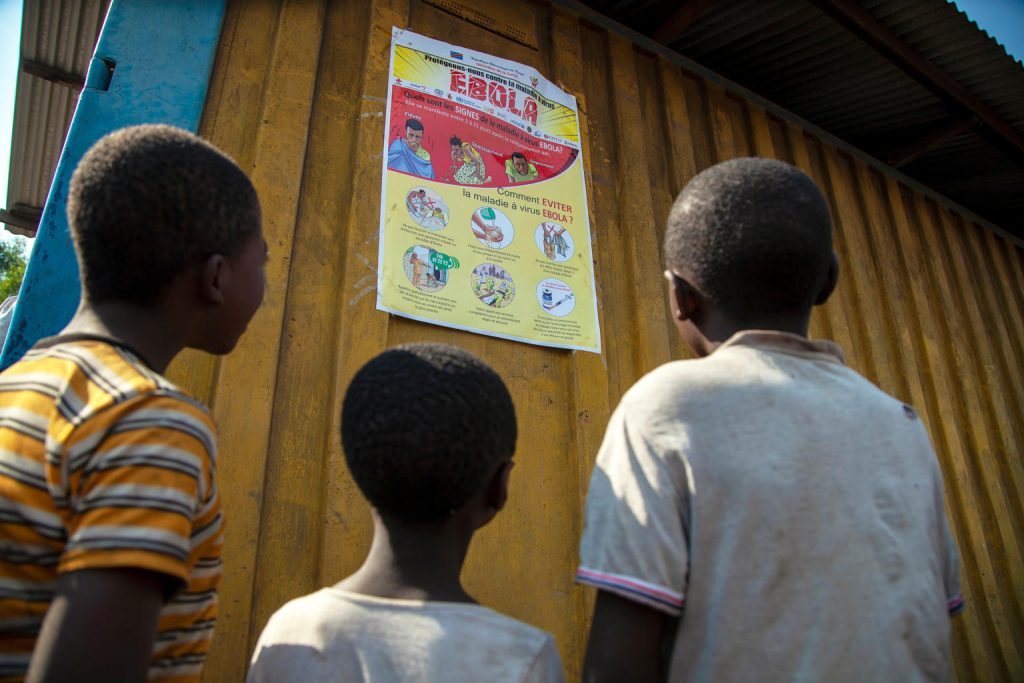Since the start of the Ebola outbreak in North Kivu, Democratic Republic of Congo (DRC), the International Federation of Red Cross and Red Crescent Societies (IFRC), in close partnership with the US Centers for Disease Control and Prevention (CDC), have supported the Red Cross of DRC to set up a rapid community feedback mechanism. A network of Red Cross volunteers living in the outbreak area collect rapid and regular perception data about Ebola and wider health issues of affected communities. These data inform responders about community concerns, perceptions, beliefs, priorities, and needs, and is used to tailor response mechanisms to make them more appropriate and effective.
Countries
Democratic Republic of Congo
UNICEF/UN0228959/Naftalin
On 10 August 2018, children read an Ebola-awareness poster in North Kivu, the Democratic Republic of the Congo (DRC).
Following the 1 August 2018 announcement by the Government of the Democratic Republic of the Congo (DRC) of a new Ebola Virus Disease (EVD) outbreak in North Kivu, UNICEF has mobilized its teams to help contain the spread of the disease and protect children. The impact of an outbreak on children can be far reaching. It’s known from earlier outbreaks in the DRC as well as in West Africa that children can be affected in various ways. Children can themselves be infected by the disease, but the impact goes beyond; it impacts their families and communities as children can lose their parents, care-givers and teachers. Access to basic services such as health care and education can become severely compromised. Also, children who are infected or whose relatives are, face stigmatization and social exclusion.
The Congolese Government has activated its response plan and called its partners, including UNICEF, to participate in the response. UNICEF has deployed a team to Beni for the response, including health specialists, communication specialists and a water, sanitation and hygiene specialist from the Ebola-response team in the Province of Equateur. Health, water, sanitation and hygiene and communication supplies have been sent to the affected areas including 300 laser thermometers to monitor the health conditions of people in the affected region and 2,000 kg of chlorine to treat water to help contain the spread of the disease. As at 14 August 2018, UNICEF has installed 35 chlorination points, as well as handwashing units in 45 public places and in health facilities in the affected areas of Beni and Mangina in North Kivu. UNICEF has supported the distribution of prevention posters and leaflets, and worked with communities, in public places and with local radio stations to promote safe hygiene and sanitation practices that help contain the spread of the
Related content
Question Bank
Tools
Viral haemorrhagic fevers question bank
This Question Bank is relevant to outbreaks where person-to-person transmission has been identified as a significant contributor to the spread of the outbreak and where patient experiences of care must be understood for a community-centred response.
SSHAP
2024
Tools
Rapid qualitative assessment training – 10 modules in English and French
This training aims to contribute to more effective and community-centred responses by strengthening systems for the utilisation of community data in emergency response by ministries of health, government and partners.
Collective Service
2024
Briefing
Post-trauma impacts in conflict-affected communities in northern Nigeria
This Key Considerations brief compares the biomedical framing of post-traumatic stress disorder with the social science understanding of the drivers of and possible solutions for mental health impacts of trauma.
West Africa Hub
SSHAP
2024
Briefing
Addressing the kush epidemic in Sierra Leone
This Key Considerations brief contextualises and provides insight into an epidemic which is symptomatic of deeper, long-standing issues which require sustained and comprehensive solutions beyond immediate emergency measures.
West Africa Hub
SSHAP
2024


